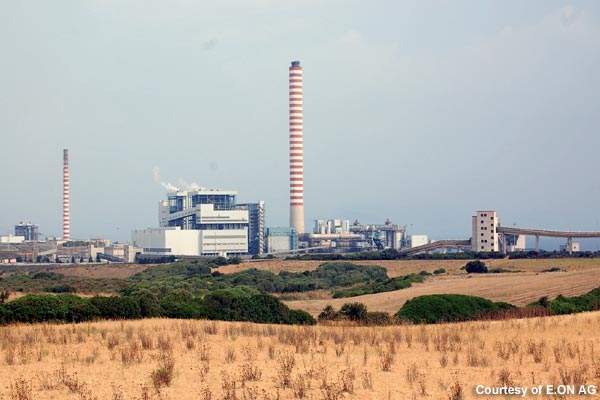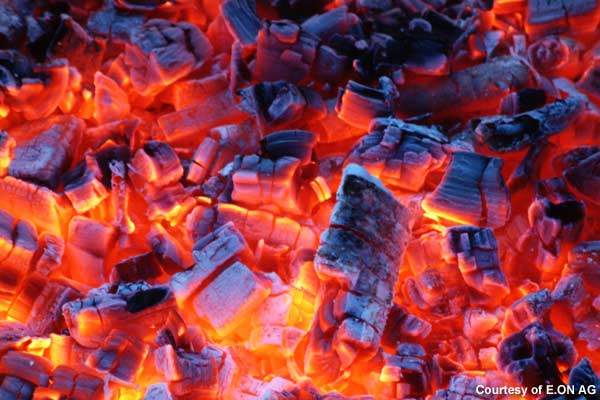Fiume Santo is a thermoelectric power plant owned by the E.ON group. The plant is situated in the north west of Sardinia, in the Sassari province. Spread over an area of 153 hectares on the Gulf of Asinara, the plant is considered to be one of the most important industrial facilities in northwestern Sardinia.
The Fiume Santo Power station was originally set up in 1960s and supplies electricity to Sardinia and adjoining areas. The plant has four traditional thermoelectric units, two coal sections, and two fuel oil sections.
Recently two exclusive gas turbine sections of 40MW each were installed for the stabilisation and safety of the high-voltage electricity transmission network. The plant has an installed power capacity of 1,041MW. The two fuel oil-fed units came into production in 1983-84 and have rated power of 160MW each. The two coal-fed units came into production in 1992-93 and have rated power of 320MW each. The two turbo gas units came on line at the end of 2005.
In 2003, an orimulsion-to-coal revamping project in units 3 and 4 was started to reduce environmental impact and improve the plant efficiency. The project required the retrofit of the ash cooler to handle the bottom ash, to improve coal waste management. Magaldi Ricerche e Brevetti (Magaldi) provided the MAC ash cooler retrofit. MAC is a patented coal waste management technology of Magaldi.
Plant upgradation and expansion
E.ON filed an application in January 2006, seeking permission to build a new 410MW coal group in the Fiume Santo plant. The unit was planned with a new conception called ‘Ultra super critical cycle’ to replace the two fuel oil fed groups of the station.
The company applied seeking the permission of the VIA Commission (The National Environmental Impact Assessment Commission) before starting the replacement process. On 4 December, 2008 it received a favourable environmental impact assessment. The new coal group unit is expected to be operational from 2014.
In addition, E.ON is also considering the use of biomass in co-combustion in the existing coal sections. The company has already submitted an application to the respective authorities and is awaiting the permit.
Transmission links to the mainland
Power stations in Sardinia are known for their surplus electricity production which supply power to the region, whereas the only problem the region had encountered was insufficient transmission links as it is an island situated over 400km from the mainland.
In 2006, the power and automation technologies company ABB supplied a high voltage direct current (HVDC) converter station to Terna – Rete Elettrica Nazionale SpA to link the Fiume Santo Power at Sardinia to a key substation in Rome, where it will be fed into the mainland grid. ABB supplied the converter stations including converter transformers and air-insulated and gas-insulated switchgear.
ABB had also provided HVDC system, a bipole of a total of 1,000MW. It delivers surplus power from the island to the mainland, thus strengthening the country’s power grid near Rome.
Known as the Sardegna Peninsola Italy link (SAPEI), the linking project has been completed in two phases.
Environmental protection initiatives
E.ON has taken significant steps towards protecting the environment at the Fiume Santo power station. Electrostatic precipitators were installed in both the coal- and fuel oil-fed units to remove the emitted particulate from the effluent smoke. In order to reduce the nitrogen oxides in the fuel oil-fed plants, the plant employed the Burner out of Service (B.O.OS) technique. For reducing the nitrogen oxides and sulphur oxides emitted in the third and fourth units (coal-fed), the plant uses denitrifiers and desulphurisers.
Air and soil pollution at the plant is controlled by a monitoring network around the station, covering about 30km area. The plant has a registered environmental management system and is ISO 9001 certified for combustion, fly ash production, and discharge.
About E.ON group
E.ON is one of the world’s largest public power and gas companies and has operations in more than 30 countries. The group has integrated activities in both the energy and gas fields in the upstream (production of electricity and natural gas), midstream (import, transmission and trading of energy) and downstream (supplying to end-users).





